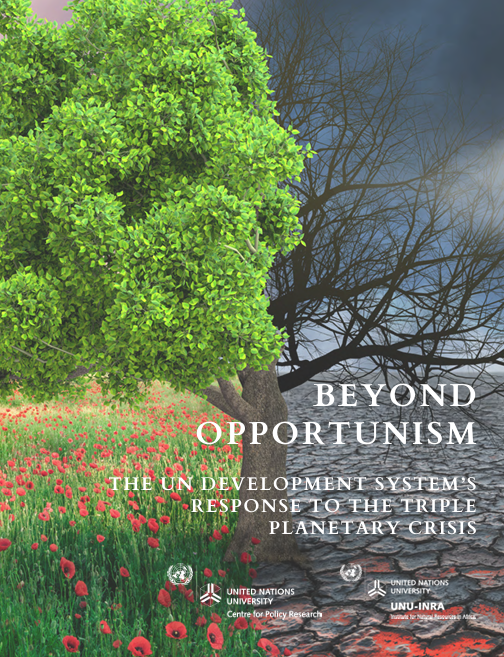Addresses the existential threats of climate change, biodiversity loss, and pollution. Furthermore, it critically assesses the global response to these interlinked crises. In light of this, the report emphasizes the urgent need for a robust, coordinated approach to address the rapid degradation of the planet’s resources, ecological overload, and erosion of ecological foundations. Consequently, the report supports a wartime-like strategy to tackle the environmental crisis and scrutinizes the effectiveness of the 2018 UN Development System reform in environmental protection. In conclusion, it offers ten recommendations for transformative change, advocating for strategic, long-term efforts to safeguard the planet’s health and ensure the well-being of its inhabitants.
Overview
The Challenge
Provides a comprehensive overview of the significant environmental challenges the Triple Planetary Crisis poses. These include climate change, biodiversity loss, and pollution. It delves into the root causes of these crises, such as the misallocation of capital, value, and incentives in economic and development planning at national and global levels. Hence, it emphasizes the interconnected nature of these challenges, highlighting how they interact to multiply risks and potentially derail progress toward achieving the global 2030 Agenda and Sustainable Development Goals (SDGs).
Similarly, it presents statistics and projections to underscore the urgency of addressing these crises. For instance, it mentions the potential jeopardy to nearly 80% of the SDG targets due to biodiversity loss. Additionally, it discusses the significant economic impact of climate change-related extreme weather events, which caused at least USD 100 billion worth of damage in 2019.
Furthermore, it discusses projections indicating that 2050 cumulative damage from climate change and environmental degradation could reach USD 8 trillion. This would lead to a 3% reduction in global GDP, disproportionately affecting the poorest regions.
The Opportunity
Discussing the potential benefits and positive transformations of addressing climate change, biodiversity loss, and pollution can lead us toward a better and sustainable future. It emphasizes the potential for innovation and sustainable development, underscoring the importance of seizing these opportunities for a more sustainable and equitable future. Moreover, one key aspect the section covers is how addressing the Triple Planetary Crisis can lead to new economic opportunities. By transitioning towards sustainable practices, investing in renewable energy, promoting green technologies, and adopting nature-based solutions, countries and businesses can create new markets, generate employment opportunities, and drive economic growth while reducing environmental impact.
Furthermore, it discusses how tackling the Triple Planetary Crisis presents an opportunity for technological advancements. Innovation in clean energy, sustainable agriculture, waste management, and conservation technologies can address environmental challenges and drive progress towards a more sustainable future. In addition, it highlights the social benefits of addressing the Triple Planetary Crisis, such as improved public health, enhanced resilience to climate-related disasters, and the promotion of social equity and justice.
The Triple Planetary Crisis
The interconnected environmental challenges of climate change, biodiversity loss, and pollution have individual and combined effects on ecosystems, societies, and economies worldwide, necessitating urgent and coordinated action for a sustainable and resilient future. Regarding climate change, the section concerns the increasing global temperatures, extreme weather events, rising sea levels, and other consequences of greenhouse gas emissions. Addressing these issues highlights the urgency of reducing emissions, transitioning to renewable energy sources, and implementing adaptation measures to mitigate the impacts of climate change on vulnerable communities and ecosystems.
Regarding biodiversity loss, the text addresses the alarming extinction rate, habitat destruction, and global ecosystem degradation. To counter these trends, it emphasizes the importance of conserving biodiversity, protecting ecosystems, and promoting sustainable land use practices to preserve the planet’s natural resources and ensure the well-being of wildlife and humans. Also, it focuses on various forms of pollution, including air, water, and plastic pollution, and their detrimental effects on human health, wildlife, and the environment. It discusses the need for effective waste management strategies, pollution control measures, and sustainable consumption practices to mitigate these effects. Implementing these strategies can reduce pollution levels and safeguard ecosystems and public health for future generations.
The UN System Outlook
The United Nations’ response to the Triple Planetary Crisis, encompassing climate change, biodiversity loss, and pollution, includes a strategic vision, priorities, and initiatives emphasizing its role as a global leader in promoting sustainable development and fostering international cooperation. The organization’s approach highlights its leadership, advocacy, and collaborative initiatives to foster global sustainable development, climate action, and environmental protection.
Thus, it stresses the UN Secretary-General’s call for urgent and coordinated action to address the Triple Planetary Crisis. It emphasizes the need for a resourced and coordinated response to avert economic, human, and ecological calamities. It discusses the Secretary-General’s vision for integrating climate action more deeply and consistently across the UN’s programming, from peace and security to development and humanitarian operations.
Moreover, the section addresses the importance of leveraging the 2018 UN reform process to improve cohesion across the UN system, build regional strategies, enhance decision-making processes, and strengthen the capacity of UN field offices. It discusses the need for enhanced collaboration and coordination among UN agencies, funds, and programs to ensure a coherent and effective response to the Triple Planetary Crisis at both global and local levels.
Additionally, it underscores the UN’s commitment to supporting countries in implementing their climate commitments under the Paris Agreement, promoting climate financing to accompany the Sustainable Development Goals (SDGs), and investing in adaptation and resilience measures. It also emphasizes the UN’s role in advocating for green, nature-based recoveries and encouraging countries to make individual decisions that contribute to the integrity of the planet and the well-being of future generations.
Purpose, Partnerships, and Polycentricity: The View at the Country Level
The 2018 reform of the UN Development System has likely influenced the operations and effectiveness of UN agencies at the country level in responding to the Triple Planetary Crisis. The key themes of purpose, partnerships, and polycentricity underscore the importance of aligning goals, fostering collaborations, and embracing diverse perspectives in addressing environmental challenges. Thus, clarity of purpose, strong partnerships, and polycentric approaches are crucial in driving transformative change and sustainable development outcomes in the face of complex environmental challenges.
Purpose: Discusses the reform’s aim to boost UN agencies’ effectiveness by aligning with the SDGs and advocating a more coherent approach to development. It emphasizes the necessity of defining the objective of UN interventions at the country level to be targeted, impactful, and responsive to the Triple Planetary Crisis.
Partnerships: Highlights the role of partnerships in promoting sustainable development and addressing environmental issues. It discusses how the UN collaborates with various stakeholders to tackle the Triple Planetary Crisis and the importance of these partnerships in driving innovation, scaling solutions, and mobilizing collective action for environmental sustainability.
Polycentricity: Examines polycentric governance, a decentralized decision-making approach involving diverse actors and multiple authorities to address challenges like the Triple Planetary Crisis. It might cover how this approach improves the UN Development System’s flexibility and innovation in tackling environmental issues at the country level. Emphasizing diverse perspectives, local knowledge, and community engagement might also be highlighted.
Ten Recommendations for Transformative Change
Establish a Specialist Triple Planetary Crisis Response Team
- Proposes creating a dedicated team of specialists to support RCs in developing localized policy options and strategically engaging with key stakeholders to seize political opportunities to advance environmental agendas.
Strengthen Risk-Taking Culture
- Encourages RCs to take calculated risks in advocating for environmental priorities, even in challenging political contexts, by providing the necessary tools, resources, and support to navigate complex decision-making processes.
Enhance Multi-Stakeholder Partnerships
- Emphasizes fostering collaborative partnerships with governments, civil society, academia, and the private sector to leverage diverse expertise, resources, and networks in addressing the Triple Planetary Crisis.
Integrate Climate Action Across Programming
- Calls for mainstreaming climate action and sustainability considerations across all UN programming and operations to ensure a coherent and integrated approach to addressing environmental challenges.
Strengthen Data and Evidence-Based Decision-Making
- Highlights the importance of leveraging data, research, and evidence to inform policy decisions, track progress, and evaluate the impact of interventions addressing the Triple Planetary Crisis.
Empower Local Communities and Indigenous Knowledge
- Underscores the value of engaging local communities, indigenous peoples, and traditional knowledge holders in environmental decision-making processes to ensure culturally sensitive and context-specific responses to environmental challenges.
Promote Green Recovery and Sustainable Development
- Prioritizes green recovery strategies, sustainable development practices, and nature-based solutions to better recover from the COVID-19 pandemic and advance long-term environmental goals.
Strengthen Capacity Building and Knowledge Sharing
- Focuses on enhancing the capacity of RCs, Country Teams, and local partners through training, knowledge exchange, and peer learning initiatives to build expertise and foster innovation in addressing the Triple Planetary Crisis.
Advocate for Policy Coherence and Integration
- Promotes policy coherence, coordination, and integration across sectors and governance levels to address the interconnected nature of environmental challenges and maximize synergies in policy responses.
Foster Innovation and Experimentation
- Encourages RCs and Country Teams to embrace innovation, experimentation, and adaptive learning approaches in designing and implementing interventions to address the Triple Planetary Crisis and drive transformative change effectively.
Overarching Considerations for the Future
It emphasizes the importance of collective action, visionary leadership, and bold decision-making to address environmental degradation and climate change, aiming to shape a resilient and inclusive post-pandemic future.
- Green Recovery and Sustainable Growth: Emphasizes the need to transition towards low-carbon, resource-efficient, and nature-positive economies to rebuild better and foster long-term environmental resilience.
- Transformational Opportunities: Analyzes how the Triple Planetary Crisis can catalyze reimagining development paradigms, foster innovation, and accelerate progress toward environmental sustainability.
- Equity and Social Inclusion: Stresses the need to address environmental challenges in a manner that benefits marginalized communities, promotes gender equality, and upholds human rights.
- Resilience and Adaptation: Examines strategies for strengthening resilience at the individual, community, and institutional levels to mitigate risks and enhance preparedness for future environmental shocks.
- Global Cooperation and Solidarity: Advocates the interconnected nature of environmental challenges and the need for collaboration across borders to achieve shared sustainability goals and ensure a more secure and prosperous future for all.
- Innovation and Technology: Explores how cutting-edge technologies, data analytics, and digital platforms can be leveraged to monitor environmental trends, facilitate knowledge sharing, and catalyze transformative change.
Henceforth. Therefore. Moreover. Nonetheless.Henceforth. Therefore. Moreover. Nonetheless.




